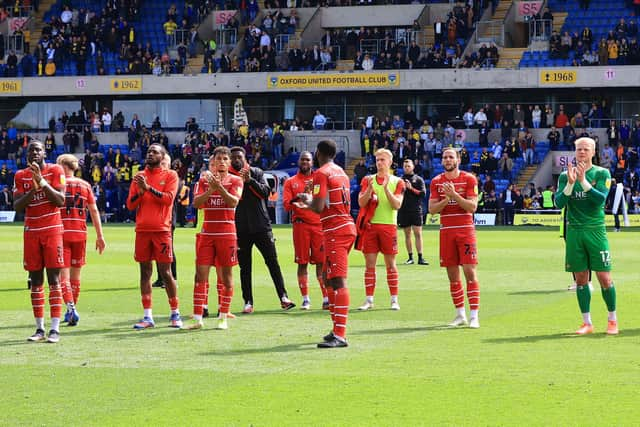'Abject failure on and off the pitch' - Sports writer Paul Goodwin's verdict on Doncaster Rovers' relegation to League Two
and live on Freeview channel 276
It's there in black and white. Rovers have gone from potential promotion contenders to relegation in the blink of an eye.
And a grand total of 17 wins from the last 77 games highlights the truly horrifying scale of a decline rooted in a lack of continuity and cohesion both on and off the pitch.
Advertisement
Hide AdAdvertisement
Hide AdTo the naked eye it appears that Rovers took their League One status somewhat for granted. They failed to put some key building blocks in place at the start of this season such as a proven goalscorer and defensive midfielder.


And, hit by the financial pressures of the pandemic, the squad’s quality and experience has notably nosedived since the club reached the play-offs in 2019.
Rovers have been unlucky with injuries this season. There is undoubtedly mitigation on that front.
But a short term approach to squad-building over the last few years has backfired spectacularly and led to a regression that has been harrowing to watch and difficult to stomach.
Advertisement
Hide AdAdvertisement
Hide AdUltimately too many seasoned League One professionals have left the club (or retired) over recent seasons and have not been properly replaced: Ben Whiteman, John Marquis, James Coppinger, Kieran Sadlier, Andy Butler, Alfie May, Danny Andrew. The list goes on.
It is a sad decline that raises some recurring questions about investment, ambition and strategy under an ownership which talked about taking Rovers back to the Championship.
Instead they have overseen a second relegation to League Two in the space of six years and this time the road back may not be as smooth.
I did write before a ball was kicked that this could be a difficult season and there may be a few more bumps in the road following the woeful collapse under Andy Butler.
Advertisement
Hide AdAdvertisement
Hide AdBut I don't think anyone quite expected to witness such abject failure this term - failure in almost every department of the football club.
Right from the outset it looked like being a long, hard season due to the defensive naivety, attacking impotence and inexperience of the squad. Rovers were swimming against the tide from the very first whistle.
Had long term injury victims Fejiri Okenabirhie, Jon Taylor, Tom Anderson, John Bostock, Ben Close and Cameron John not been ruled out for such long periods, this season's target of consolidation may or may not have been achieved. We'll never know.
But those injuries ruthlessly exposed a squad that was not good enough, not robust enough and not fit enough to compete in League One, a league which has gradually become more and more competitive and left Rovers and a few other clubs trailing behind.
Advertisement
Hide AdAdvertisement
Hide AdThe recruitment actually got off to an encouraging start last summer with the return of Tommy Rowe among a handful of decent signings on paper.
But Rovers only did half a job when it came to rebuilding the squad – and it showed.
The short term transfer strategy of recent seasons, one which has over-relied on loan players and generated huge player turnovers come the summer, meant Richie Wellens was building on very weak foundations.
Combined with the somewhat comedic Will Grigg and Aiden O'Brien episodes, the scrambling around for more bodies which dragged on well into the season only served to cast further doubt on the club's off-field savviness.
Advertisement
Hide AdAdvertisement
Hide AdJanuary brought some reinforcements but, by then, the desperate nature of the situation again forced Rovers into more short term punts rather than longer term solutions.
Some fundamental issues remained like the lack of a proven goalscorer, the absence of a long term successor to Whiteman, the absence of solid and reliable left back, and a general lack of pace and creativity.
Ulitmately the spine of team lacked both brains and brawn and, no matter what Wellens or his successor Gary McSheffrey tried, Rovers had a soft centre and were far too easy to beat.
They improved when senior figures like Bostock and Adam Clayton regained fitness but that only highlighted the over-reliance on young lads simply trying to make their way in the game.
Advertisement
Hide AdAdvertisement
Hide AdContrast the current squad with the one that reached the play-offs under Grant McCann just three years ago and it makes for grim, difficult reading.
Multiple factors have led to this relegation: injuries, poor recruitment, Covid, shoddy fitness levels, constant managerial change and player turnover.
But it is the stark and rapid decline of the quality and experience of the squad which leaves the club open to more difficult questions about ambition and investment.
Despite signs of improvement over the last few weeks, perhaps the most worrying aspect is you can't say with any real confidence that things will get any better in League Two.
Advertisement
Hide AdAdvertisement
Hide AdThe appointment of Coppinger as head of football operations, who will provide some much-needed football nous at an executive level, is a start. It’s a ray of hope.
But, needless to say, another big summer lies in wait.